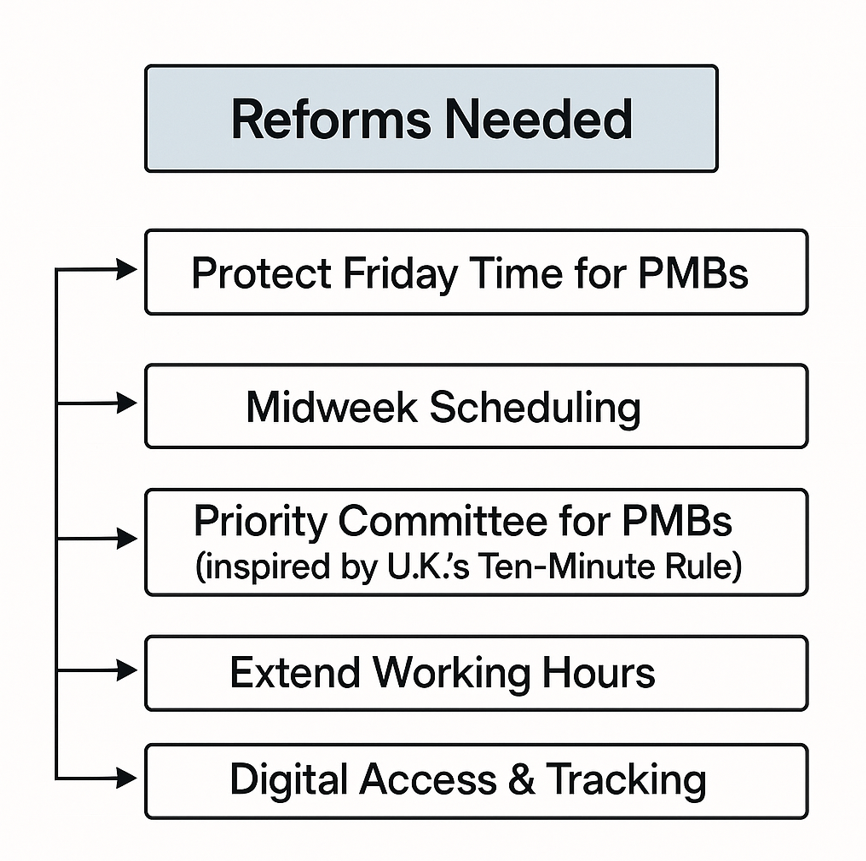There are no items in your cart
Add More
Add More
| Item Details | Price | ||
|---|---|---|---|
Mon Jun 30, 2025
పరిచయం:
ప్రైవేట్ సభ్యుని బిల్లు అనేది మంత్రి కాని ఎంపీ ద్వారా లోక్సభ లేదా రాజ్యసభలో ప్రవేశపెట్టబడే శాసన ప్రతిపాదన. ఇది కొత్త చట్టాలను ప్రతిపాదించడం లేదా ఇప్పటికే ఉన్న చట్టాలను సవరించడం లక్ష్యంగా పెట్టుకుంటుంది. మంత్రులు ప్రవేశపెట్టే ప్రభుత్వ బిల్లులకు భిన్నంగా, ప్రైవేట్ సభ్యుని బిల్లులు ఎంపీలు స్వతంత్ర శాసన ఆలోచనలను పార్లమెంటులో ప్రవేశపెట్టడానికి అనుమతిస్తాయి. ఉదాహరణకు, ట్రాన్స్జెండర్ వ్యక్తుల బిల్లు (2014) ఒక ప్రైవేట్ సభ్యుని బిల్లుగా ప్రవేశపెట్టబడి, చివరికి ప్రభుత్వం యొక్క ట్రాన్స్జెండర్ రక్షణ చట్టం, 2019 రూపొందడానికి దోహదపడింది.
విషయం:
ప్రైవేట్ సభ్యుని బిల్లులు (PMBs) అంటే ఏమిటి? నిర్వచనం:
-ప్రైవేట్ సభ్యుని బిల్లులు అనేవి మంత్రులు కాని పార్లమెంటు సభ్యులు (ఎంపీలు) ప్రవేశపెట్టే శాసన ప్రతిపాదనలు. ఇవి ఎంపీలు కార్యనిర్వాహక ఎజెండాకు స్వతంత్రంగా సమస్యలను లేవనెత్తడానికి, కొత్త చట్టాలను సూచించడానికి లేదా ఇప్పటికే ఉన్న చట్టాలను సవరించడానికి అనుమతిస్తాయి.
ప్రధాన లక్షణాలు:
1. మంత్రులు కాని ఎంపీలు (పాలక లేదా విపక్ష) ద్వారా ప్రవేశపెట్టబడతాయి.
2. స్వతంత్ర, సంస్కరణాత్మక, మరియు నియోజకవర్గ ఆధారిత చట్టాల నిర్మాణానికి అవకాశం కల్పిస్తాయి.
3. ప్రస్తుత నియమాల ప్రకారం, ఇవి పార్లమెంటులో శుక్రవారాల్లో మాత్రమే చర్చించబడతాయి.
4. ప్రభుత్వ బిల్లుల మాదిరిగానే శాసన ప్రక్రియ (మొదటి పఠనం, రెండవ పఠనం మొదలైనవి)కు లోబడి ఉంటాయి.
5. ప్రభుత్వ సిఫారసు లేకుండా వ్యయం లేదా పన్ను సంబంధిత విషయాలను కలిగి ఉండవు.
6. లోక్సభలో నియమం 66 మరియు రాజ్యసభలో నియమం 62 ద్వారా ఇది నిర్వహించబడతాయి.
ప్రైవేట్ సభ్యుని బిల్లుల ప్రక్రియ:
1. డ్రాఫ్టింగ్ మరియు నోటీసు:
-ఎంపీలు బిల్లులను రూపొందించి, కనీసం ఒక నెల ముందస్తు నోటీసుతో సమర్పిస్తారు.
2. ప్రవేశపెట్టడం:
-బిల్లులు పార్లమెంటులో ప్రవేశపెట్టబడతాయి. ఆ తర్వాత ప్రాథమిక చర్చలు జరుగుతాయి.
3. చర్చ:
-ఎంపికైన బిల్లులు, సాధారణంగా శుక్రవారం మధ్యాహ్నం సెషన్లలో చర్చించబడతాయి.
4. నిర్ణయం:
-బిల్లులు ఉపసంహరించబడవచ్చు లేదా ఓటింగ్కు వెళ్లవచ్చు.
ప్రైవేట్ సభ్యుని బిల్లుల ప్రాముఖ్యత:
1. స్వతంత్ర ఆలోచన మరియు ఆవిష్కరణను ప్రోత్సహిస్తాయి:
a. పీఎంబీలు ఎంపీలు పార్టీ లేదా ప్రభుత్వ నియంత్రణకు మించిన విధానపరమైన సమస్యలను లేవనెత్తడానికి అనుమతిస్తాయి.
b. ఉదాహరణ: రైట్ టు డిస్కనెక్ట్ బిల్లు (2019) డిజిటల్ శ్రమ హక్కులు మరియు జీవన-పని సమతుల్యతపై చర్చను ప్రారంభించింది.
2. సామాజిక సమ్మిళనం మరియు న్యాయం:
a. అట్టడుగు సమాజాలు మరియు పట్టించుకోని సామాజిక సమూహాల సమస్యలపై దృష్టిని ఆకర్షిస్తాయి. చట్ట నిర్మాణంలో సమానత్వం మరియు ప్రాతినిధ్యాన్ని పెంపొందిస్తాయి.
b. ఉదాహరణ: శశి థరూర్ ట్రాన్స్జెండర్ వ్యక్తుల కోసం విద్య మరియు ఉపాధిలో 1% రిజర్వేషన్ను ప్రతిపాదించే బిల్లును ప్రవేశపెట్టారు. లింగ-వైవిధ్య జనాభా కోసం సానుకూల చర్యల అవసరాన్ని ఇది తెలియజేస్తుంది.
3. కార్యనిర్వాహక ఆధిపత్యాన్ని సమతుల్యం చేస్తుంది:
a. క్యాబినెట్ శాసన ఎజెండాపై కేంద్రీకృత నియంత్రణను తగ్గిస్తుంది.
4. ప్రగతిశీల విధాన చర్చ:
a. తక్షణ ప్రభుత్వ దృష్టిలో లేని సామాజిక సమస్యలను ఇది తెలియజేస్తుంది.
b. ఉదాహరణ: నినాంగ్ ఎరింగ్ ప్రవేశపెట్టిన ఋతుచక్ర లాభదాయక బిల్లు (మెన్స్ట్రువేషన్ బెనిఫిట్స్ బిల్లు) (2017) పని చేసే మహిళలకు రెండు రోజుల చెల్లింపు ఋతుస్రావ సెలవు కోరింది. కార్యస్థలంలో లింగ సున్నితత్వం మరియు ఋతుస్రావ ఆరోగ్యంపై చర్చను ప్రారంభించింది.
5. పాలన విధానాలను మెరుగుపరచడం:
a. 1952లో పార్లమెంటు ఆమోదించిన మొదటి ప్రైవేట్ సభ్యుని బిల్లు, ముస్లిం వక్ఫ్ బిల్లు, వక్ఫ్ ఆస్తుల పరిపాలన మరియు నిర్వహణను బలోపేతం చేయడం లక్ష్యంగా పెట్టుకుంది.
b. ఇది 1954 వక్ఫ్ చట్టం రూపొందడానికి దారితీసింది. ఇది తర్వాత 2025లో వక్ఫ్ (సవరణ) చట్టంగా సవరించబడి, నియంత్రణ పర్యవేక్షణను మెరుగుపరిచింది.
6. జాతీయ మరియు రాజ్యాంగ చర్చలను ఉత్తేజపరచడం:
a. ప్రైవేటు మెంబర్ బిల్లులు ప్రజాస్వామ్య అంశాలపై ప్రజా చర్చలను ప్రేరేపిస్తాయి.
7.పార్టీలకు అతీతంగా ఎంపీలను సాధికారపరచడం:
a. ఎక్కువగా కార్యనిర్వాహక శాఖ ఆధీనంలో ఉన్న పార్లమెంటులో, శాసన నిర్మాణాన్ని ప్రజాస్వామీకరించడం ద్వారా మంత్రులు కాని ఎంపీలకు శాసన గొంతును అందిస్తాయి.
సవాళ్లు:
1. పార్లమెంటు సమయం మరియు దృష్టి లోపం:
a. పీఎంబీలు శుక్రవారాల్లో షెడ్యూల్ చేయబడతాయి. కానీ, ఎల్లప్పుడూ ఎంపీల గైహాజరు లేదా ప్రభుత్వ కార్యకలాపాల కారణంగా అంతరాయం కలుగుతాయి.
b. పీఆర్ఎస్ లెజిస్లేటివ్ రీసెర్చ్ ప్రకారం, 17వ లోక్సభలో పీఎంబీలకు లోక్సభలో 9.08 గంటలు మరియు రాజ్యసభలో 27.01 గంటలు మాత్రమే కేటాయించబడ్డాయి.
c. చాలా మంది ఎంపీలు ఈ సెషన్లను సాంకేతికంగా పరిగణిస్తారు. దీనివల్ల చర్చలు దాటవేయబడతాయి మరియు తీవ్రత తగ్గుతుంది.
2. శాసన రూపాంతరంలో క్షీణత:
a. స్వాతంత్ర్యం నాటి నుండి, కేవలం 14 పీఎంబీలు మాత్రమే చట్టంగా ఆమోదించబడ్డాయి. 1970 తర్వాత రెండు సభలలో ఏ ఒక్కటీ ఆమోదించబడలేదు.
b. 18వ లోక్సభలో (మే 2025 వరకు), ప్రవేశపెట్టిన 64 పీఎంబీలలో ఒక్కటి కూడా చర్చించబడలేదు, మరియు రాజ్యసభలో 49 లో ఒక్కటి మాత్రమే చర్చకు వచ్చింది.
3. కఠినమైన పార్టీ నియంత్రణ మరియు వ్యతిరేక ఒత్తిడి:
a. 52వ రాజ్యాంగ సవరణ (1985) పార్టీ క్రమశిక్షణను అమలు చేస్తుంది. ఎంపీలు పార్టీ నుండి విచలనం చేయకుండా నిరుత్సాహపరుస్తుంది.
b. సమస్యలు రాజకీయం కానివి లేదా సంస్కరణల ఆధారితమైనప్పటికీ ఇది వ్యక్తిగత శాసన చొరవను తగ్గిస్తుంది.
4. శాసన ఎజెండాపై కార్యనిర్వాహక ఏకచక్రాధిపత్యం:
a. పాలక పక్ష ఎంపీలు అధికారిక విధానానికి విరుద్ధంగా కనిపించే పీఎంబీలను ప్రతిపాదించడానికి ఇష్టపడరు.
b. ఈ కేంద్రీకరణ పార్లమెంటులో ప్రత్యామ్నాయ లేదా విభేదించే గొంతులకు అవకాశాన్ని తగ్గిస్తుంది.
5. ప్రక్రియాగత మరియు సంస్థాగత మద్దతు లోపం:
a. పరిశోధన సహాయం, శాసన రూపకల్పన మద్దతు, మరియు నిర్మాణాత్మక కమిటీ విధానాల లోపం పీఎంబీ నాణ్యత మరియు పనితీరును పరిమితం చేస్తుంది.
b. ప్రత్యేక సమీక్షా సంస్థలు లేకపోవడం పేలవమైన ప్రాధాన్యత మరియు శాసన అసమర్థతకు దారితీస్తుంది.

ముగింపు.
ఇటీవల భారత ఉపరాష్ట్రపతి ప్రైవేట్ సభ్యుని బిల్లుల (పీఎంబీ) ప్రజాస్వామ్య ప్రక్రియలను బలోపేతం చేయడంలో ప్రాముఖ్యతను వివరించారు. ఆయన పీఎంబీలను "దూరదృష్టి, భవిష్యత్-దృష్టి, మరియు భారత శాసన అభివృద్ధికి బంగారు గని"గా అభివర్ణించారు. ఆయన వ్యాఖ్యలు ఈ విధానం యొక్క అపార విలువ మరియు ఉపయోగించని సామర్థ్యాన్ని నిజమైన ఉద్దేశం మరియు నిబద్ధతతో సమీపించినప్పుడు తెలుస్తుంది.